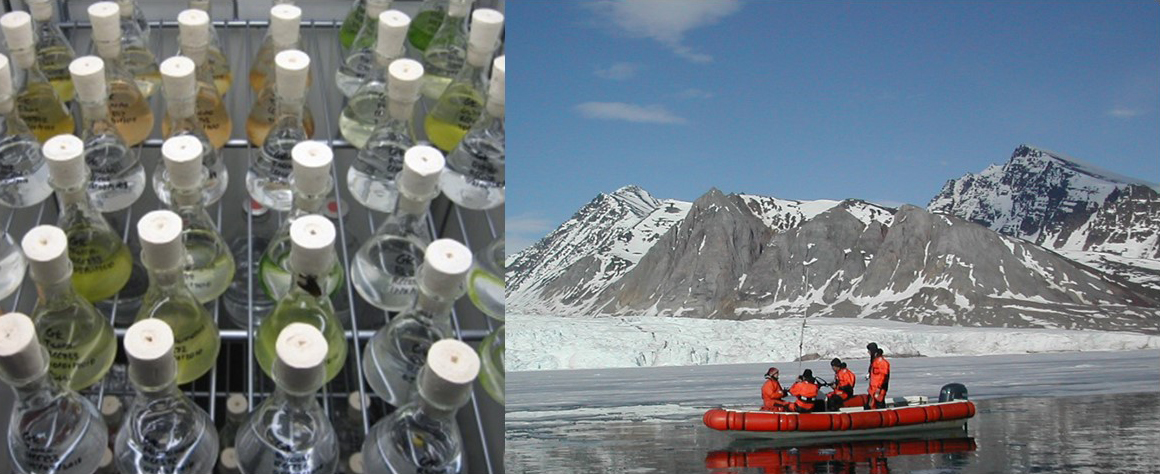Impact of global change on the marine organic carbon cycle

Overview
Primary production in the ocean by microscopic phytoplankton accounts for half of the productivity on our planet. Phytoplankton are a highly diverse group of organisms in all aspects including size, productivity, and carbon export efficiency. Most of this productivity fuels the marine food web, a fraction ends up in the deep ocean and sediments where carbon is stored for >1000 years.
Within this theme we study how climate (change) impacts the productivity and composition of marine phytoplankton, and how this influences carbon export efficiency. This is investigated using a combination of experimental approaches and field observations.
In the laboratory we investigate how environmental change, reflected in changes in temperature, irradiance, or nutrient concentrations, affect algal physiology and growth. We have a culture collection and a range of experimental facilities to support this. Photosynthetic characteristics, which are proxies for physiological state, are measured by Fast Repetition Rate (FRRf) or Pulse Amplitude Modulated (PAM) fluorometry.
We collaborate in time series research in Arctic and Antarctic coastal sites to provide baseline data on seasonal and inter annual variability of phytoplankton biomass and composition (determined using pigments, HPLC). In addition, we join expeditions to these sites and to the open ocean (North Atlantic, Mediterranean) to assess how climate influences nutrient and irradiance availability and ocean productivity and composition.
Contact person
Current project
-
Towards monitoring of taxon specific productivity in Arctic coastal phytoplankton (NWO-NPP: Arctic cluster programme, overall coordination by Arctic Centre, UG)
Previous projects
- Towards non-intrusive, high resolution primary production estimates in the Western Antarctic Peninsula region using Fast Repetition Rate fluorometry and experimentally derived electron requirements for carbon fixation (NWO-NPP, Rothera cluster programme, major research partner British Antarctic Survey, Cambridge, UK)
- Structuring of marine pelagic microbial communities by glacial meltwater in Ryder Bay, Antarctica. (NWO-NPP, Rothera cluster programme, major research partner British Antarctic Survey, Cambridge, UK)
- Changes in vertical stratification and their impact on North Atlantic phytoplankton communities (Stratiphyt project: NWO-ZKO)
- Genotypic and phenotypic variability in temperate marine picophytoplankton related to vertical mixing (NWO-ALW)
- Consequences of climate change for productivity and diversity of marine phytoplankton at King George Island, Antarctic Peninsula (ESF- Polar Climate program, project IMCOAST)
- Consequences of climate change for Arctic coastal pelagic microbial communities (IPY project, with major partner AWI, Bremerhaven, DE)
| Last modified: | 18 January 2022 3.07 p.m. |
